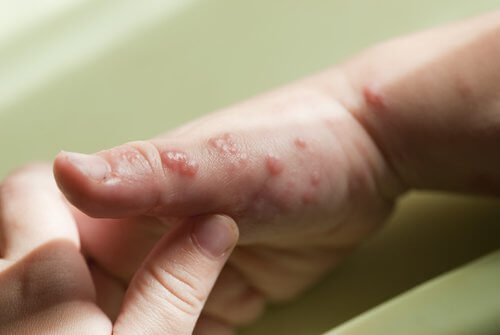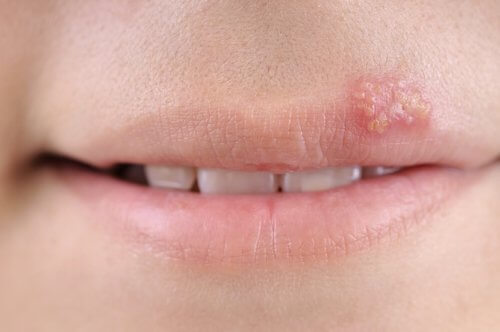How to Cure the Blisters Caused by Herpes

Simple herpes is a virus that, once contracted, is never completely eliminated from the body. It often appears in the form of blisters on the mouth or genital area, depending on each case. Do you know how to cure the blisters caused by herpes?
While it’s clear that herpes is a permanent condition, that doesn’t mean we can’t do anything to combat the bothersome symptoms. So, if you’re suffering from the blisters caused by herpes, you’ll find today’s informative text to be very useful.
There are a variety of options that are currently used to eliminate these uncomfortable blisters. These include everything from creams and antiviral medications to natural remedies.
As for natural solutions, their effectiveness often depends on the characteristics of the breakouts and the health conditions of the individual.
General information about herpes and how it spreads
Simple herpes is a fairly common affliction that tends to affect the skin around the mouth, genitals, and pharynx. In some cases in particular, it can also affect the cornea. This is considered to be a cytolytic virus.
In other words, it means that it causes cells in the body to become infected, leading to the appearance of pustules and scab-like wounds around the affected tissue.
Specifically, their aspect is like that of small red blisters. Furthermore, they leak a yellowy liquid.
There are two ways to contract this extremely contagious disease. The first is through sexual contact with an infected individual, whether or not the person is exhibiting symptoms at the time.
The second way to contract herpes usually involves oral herpes. It occurs during childhood from exposure to the virus. In this case, it doesn’t have to do with sexual contact.

How to cure the blisters caused by herpes
Blisters and sores on the mouth and genital region tend to appear on the tissue for periods of time between 7 and 10 days. People with simple herpes tend to have at least 4 or 5 of these outbreaks per year.
To determine the specific characteristics of the type of herpes present, it’s important to see a doctor. By performing a viral culture, a medical professional will be able to make a specific diagnosis. Once this is done, it will be simpler to choose the right treatment.
Before going into detail on the options for battling these breakouts, it’s important you know that you should obtain medical approval from your doctor before beginning any treatment plan. The purpose of today’s article is simply to provide information on the options you can discuss with your physician.
“Simple herpes is a fairly common affliction that tends to affect the skin around the mouth, genitals, and pharynx. In some particular cases, it can also affect the cornea”
Pharmaceutical treatments
The pharmaceutical treatments that doctors usually recommend for battling the blisters caused by herpes are usually topical creams. Among their formulas, these creams and ointments include substances like aciclovir, valacilovir and famciclovir.
Patients must apply these treatments 3 or 4 times a day over the course of 7 days. Remember that these medications won’t eliminate the herpes zoster virus. Rather, they simply serve to relieve the symptoms and reduce the duration of blisters .
Home remedies
These natural home remedies aren’t part of traditional medicine, but have proven to be highly effective in combating the sores caused by herpes. Their properties work to eliminate the pain and itchiness and contribute to the healing process.
Their effectiveness is the same or even greater than the antiviral ointments that many medical professionals recommend.
1. Liquid propolis
Propolis is an excellent ally for healing the skin and eliminating bacteria. You should apply drops to the blisters three times a day until they dry up.
2. Marigold tea
Marigold possesses excellent anti-inflammatory properties that help to provide immediate relief from pain and itching.
Specialists recommend preparing an infusion and drinking abundant amounts during the day as long as the breakout is present. At the same time, you can apply compresses soaked in the tea to the affected areas.

3. Garlic rub
Garlic is said to have antibiotic properties that help dry the blisters caused by herpes. To achieve successful healing, you should chop a garlic clove in half and rub it gently on the affected area.
As a final piece of information, we recommend maintaining a healthy diet and getting 8 hours of sleep each night. You should also seek to lead a peaceful life. Keeping your stress levels under control contributes greatly to preventing the appearance of these bothersome blisters.
All cited sources were thoroughly reviewed by our team to ensure their quality, reliability, currency, and validity. The bibliography of this article was considered reliable and of academic or scientific accuracy.
- Higgins CR, Schofield JK, Tatnall FM, Leigh IM. Natural history, management and complications of herpes labialis. J Med Virol. 1993;41(S1). Disponible en: https://www.ncbi.nlm.nih.gov/pubmed/8245888
- James, C., Harfouche, M., Welton, N. J., Turner, K. M., Abu-Raddad, L. J., Gottlieb, S. L., & Looker, K. J. (2020). Herpes simplex virus: global infection prevalence and incidence estimates, 2016. Bulletin of the World Health Organization, 98(5), 315. Disponible en: https://www.ncbi.nlm.nih.gov/pmc/articles/PMC7265941/
-
Looker KJ, Magaret AS, Turner KME, Vickerman P, Gottlieb SL, Newman LM. Global estimates of prevalent and incident herpes simplex virus type 2 infections in 2012. PLoS One. 2015. January 21;10(1):e114989. 10.1371/journal.pone.0114989
- Madavaraju, K., Koganti, R., Volety, I., Yadavalli, T., & Shukla, D. (2021). Herpes simplex virus cell entry mechanisms: An update. Frontiers in Cellular and Infection Microbiology, 10, 852. Disponible en: https://www.frontiersin.org/articles/10.3389/fcimb.2020.617578/full